#churchill county
Explore tagged Tumblr posts
Text

Carson Sink, Churchill County, Nevada, 2020.
42 notes
·
View notes
Text

Wasteland
What do you think about my pic?
#Grimes Point Archaeological Area#Fallon#Churchill County#ancient shoreline#Pleistocene Lake Lahontan#desert#Nevada#USA#summer 2024#travel#original photography#vacation#tourist attraction#landmark#landscape#countryside#archaeology#geology#photo of the day#What do you think about my pic?#flora#nature
4 notes
·
View notes
Text
Miller's Station - Pony Express
Miller’s station, also known as Reed’s Station is a pony express station located in Churchill County, Nevada. Winchester Firearms adopted the image of a Pony Express Rider. Pony Express Sources generally agree on the identity of this station as a C.O.C. & P.P. Express Co. station, possibly located near the area where the north and south branches of the original Pony Express and Overland Mail…

View On WordPress
0 notes
Text
#OTD in 1945 – In a radio broadcast, Churchill accuses De Valera’s government of frolicking with the Germans and Japanese.
In his Victory in Europe speech, Winston Churchill slams Éamon de Valera and his war-time policy. (To add fuel to an already bitter relationship, de Valera had not distinguished himself or Ireland’s reputation when he offered condolences to Germany on the death of Hitler.) “(By the dawn of 1941), The sense of envelopment, which might at any moment turn to strangulation, lay heavy upon us. We had…

View On WordPress
#Éamon De Valera#England#Germans#Germany#Ireland#Japan#Japanese#Northern Ireland#Scotland#Six Counties#Ulster#Victory Speech#Winston Churchill#WWII
3 notes
·
View notes
Video
Westerham Village Green Kent by Adam Swaine Via Flickr: On the green sitting on a plinth is a statue of the great man himself leaning back on a sofa.His rock-like features staring out over the village green in Westerham... donated by Marshall Tito and the people of Yugoslavia, this impressive sculpture of Sir Winston Churchill
#winston churchill#statue#westerham#village green#Kent#kentish villages#Village#VILLAGES#village square#uk#UK VILLAGES#english#england#britain#british#historical#statesman#kent weald#beautiful#Adam Swaine#fuji#2024#walks#South East#scenic#counties#county#summer#flickr
0 notes
Text
Delightful, Historic Fulton, Missouri!
Beautiful Fulton, Missouri has a charming downtown with shopping opportunities, history galore, and tons of fun things to do. This town with a population of around 13,000 has had some pretty famous visitors, from Winston Churchill to past Presidents! The National Winston Churchill Museum stands in a historic 900-year-old church next to Westminster College. There is also an amazing sculpture that…

View On WordPress
#agricultural preservation#Auto World Museum#Baker Potato Chip Company#barns#Beks restaurant#Berlin Wall#Brandenburg Gate#Brian Atkins#Brick District#Brick District Playhouse#brick streets#Brooke Bartlett#Brooklyn Pizza#Callaway County#Calloway County#car collection#Carolyn Linton#Churchill&039;s granddaughter#City of Fulton#classic autos#Crane&039;s Country Store#Edwina Sandys#Fulton Missouri#gastropub#general store#girl&039;s getawau#GoPO Gourmet Popcorn#Green Meadow Barn Company#hardware store#historic district
0 notes
Text
(JTA) – A global bestseller by a Jewish Holocaust victim; a novel by a beloved and politically conservative Jewish American writer; a memoir of growing up mixed-race and Jewish; and a contemporary novel about a high-achieving Jewish family are among the nearly 700 books a Florida school district removed from classroom libraries this year in fear of violating state laws on sexual content in schools.
The purge of books from Orange County Public Schools, in Orlando, over the course of the past semester is the latest consequence of a conservative movement across the country — and strongest in Florida — to rid public and school libraries of materials deemed offensive. While the vast majority of such challenged and removed books involve race, gender and sexuality, several Jewish books have previously been caught in the dragnet.
The Orange County case is unusual for the sheer volume of books removed — 699 including some duplicates, according to documents the district provided — and for the unusually large number of books about the Holocaust and Jewish identity included among them. They included:
“Suite Française,” by Irène Némirovsky, a Ukrainian-French Jewish writer who wrote her novel in secret under German occupation before perishing in Auschwitz
“Herzog,” a semi-autobiographical novel by Jewish writer Saul Bellow, an outspoken cultural conservative whose son Adam Bellow is a publisher of right-wing Jewish books
“Black, White and Jewish: Autobiography of a Shifting Self,” by Rebecca Walker, feminist theorist and daughter of author Alice Walker, whose own antisemitic comments and writings have faced scrutiny in the past
“Bee Season,” a novel about a high-achieving family of Jewish scholars and cantors, by Myra Goldberg
“The Splendid and the Vile,” a nonfiction history book about Winston Churchill’s decision to fight Hitler’s forces during World War II, by Erik Larson
The collected plays of Lillian Hellman, a Jewish playwright and left-wing activist who was accused of Communist activities
“The Storyteller,” a novel dealing with the Holocaust by bestselling author Jodi Picoult
“The Reader,” a German novel about the aftermath of the Holocaust by Bernhard Schlink
“Sophie’s Choice,” a bestselling novel also about the aftermath of the Holocaust by William Styron
“The Freedom Writers Diary,” a nonfiction compilation of several high school students’ diaries inspired by their teachers’ efforts to instruct them on the Holocaust and Anne Frank
“Books are removed from classrooms with deference to House Bill 1069,” district spokesperson David Ocasio told the Jewish Telegraphic Agency, referring to a Florida law signed this year that heavily restricts instruction and classroom materials about human sexuality.
No individual reasoning was given for each book’s removal, but Ocasio said that all of the books had been marked as “not approved for any grade level.” He added that every book will go through a secondary review to determine if it will be restricted to certain grade levels or “weeded from the collection” altogether.
Some of the books on Orange County’s list have come under scrutiny in the past for removals from other districts. “The Storyteller” was the subject of widespread press coverage after a member of the right-wing activist group Moms For Liberty successfully pushed for its removal from a different Florida school district earlier this year. “Sophie’s Choice” was recently removed from a third Florida school district at the behest of a Jewish parent’s challenge; both parents said their challenges were due to sexual content.
Other outwardly Jewish books on the list, including “The Reader” and Philip Roth’s “Portnoy’s Complaint,” contain explicit sexual content. Non-Jewish World War II novels “Slaughterhouse-Five” and “Catch-22” were also pulled.
Among the hundreds of other books flagged for removal in the district were frequently challenged books like “Gender Queer” and “The Handmaid’s Tale,” as well as literary standards like Milton’s “Paradise Lost” and Maya Angelou’s “I Know Why The Caged Bird Sings,” and children’s fare like a book based on Disney’s “The Incredibles.” Some items were listed more than once.
Other districts in Florida this year have pulled an illustrated adaptation of Anne Frank’s diary in order to comply with the state law.
193 notes
·
View notes
Text
Deconstructing Mr Darcy
My favourite character in all Austen canon is Mr Darcy. Unfortunately, as soon as I say this, everybody is like

Because when I say this people think of this…

And this…

But that’s not why he’s my favourite character.
There is this famous quote by P.D. James in which she argues that Austen's Emma is like a predecessor of the detective novel, in the way that she sprinkles clues as to what's really going on with Frank Churchill.
And ever since, I've been reading Pride and Prejudice differently, because of course she does something similar there too.
Specifically, Austen constructs this elaborate character puzzle with Mr Darcy at its centre. Every time he and Elizabeth clash, throughout the novel, one of the central conflicts sparks up: what is Darcy really like?
Elizabeth’s early interest in him is often interpreted as sexual tension/latent attraction. I’m not saying this isn’t the case (you can argue about this). But what is evident is that her intellectual interest in characters is roused by him. Because, well, he really presents her with a tricky puzzle.
1) The mysterious man at the ball
When Elizabeth and her sisters go to the Assembly Ball at Meryton, remember, they go there to ogle Mr Bingley. He is the rich, handsome bachelor they hope to dance with when they get there.
But then they actually arrive and it’s someone else who has everyone talking. Mr Darcy. He’s the tall, handsome stranger who turns out to be much, much richer than Mr Bingley, and who gets everyone excited.
Who will he dance with?
Well, nobody because he’s like way too important to deign to notice any of them. He stoops to acknowledge that Jane, literally the most beautiful girl in the county, is somewhat pretty. But her sister is totally beneath his notice.
With this twist upon a twist, the author invites Elizabeth and the reader to abandon their first suspicion that he’s the hero and to consider him a little absurd instead. And this is a comic novel. By that point we have met multiple absurd characters, so we know this is what is to be expected from this story.
2) The cracks
The narrator hints that Darcy enjoys a good gossip with his friends and spends his free time dissecting the many ways in which the local women don’t interest him. Again, absurd, remember? Elizabeth is among the women he judges harshly, but as he sees more and more of her this happens:
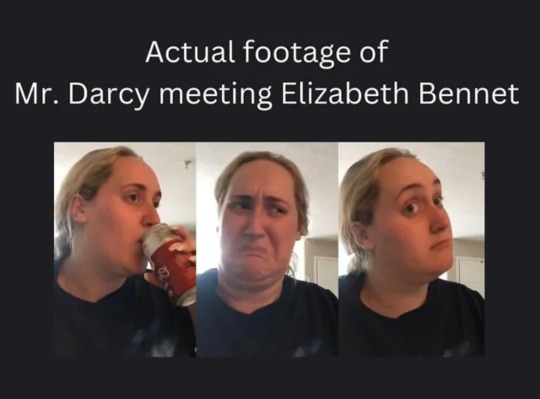
So the reader is now invited to some irony which Elizabeth is not privileged to enjoy. But it’s all in service of the comedy, right? Because it’s more delicious for the reader to see the contrast of how much Elizabeth is wrong about what he thinks of her.
You, the reader, have a good chuckle with the author about this, don’t you? But while you’re laughing you’re MISSING A CLUE! And it’s right there: Elizabeth is wrong about Darcy. It’s lampshading the fact that she doesn’t really understand him at all.
3) The real deal
So then we get a little closer to Darcy. Elizabeth stays with him and his friends at Netherfield to nurse her sister. As Darcy continues to admire her, and as she continues to be oblivious, one evening he approaches her and this happens:
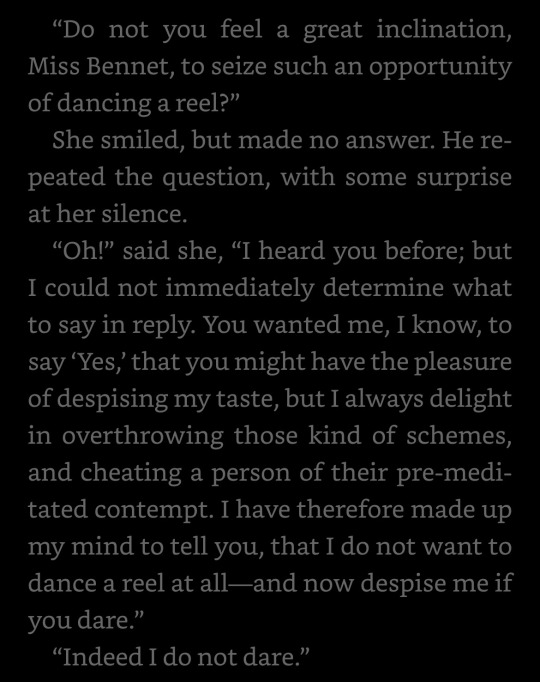
Again Elizabeth is wrong about Darcy, but here Austen adds another clue:

So… the guy who has the superpower of turning any normal situation awkward makes this super awkward situation… charming?
And then Austen adds some misdirection by immediately adding:
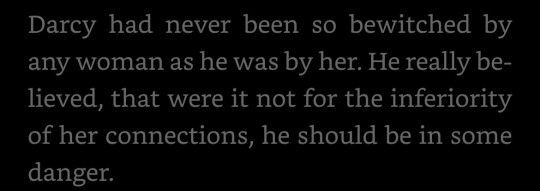
And we’re focusing on the irony that this guy is more enchanted with her the more she rejects him. And we’re a little amazed at how arrogant this guy is that he doesn’t see how much he is disliked at this moment. Almost as self-important and oblivious as Mr Collins.
And so we don’t see that… he’s nice? And I mean, an arrogant, self-important arse, as Elizabeth thinks of him, wouldn’t be nice at this point. He’d be wounded. He’d make it awkward. Importantly, he’d make it awkward for her.
It’s hard to get out of a situation like this gracefully. But he can. He knows how. He has that ability.
And this works as a bit of foreshadowing too, of course. Dancing and courtship are pretty strongly linked in Austen (and culturally in that era) and so his acceptance of her rejection in this manner lampshades his character as a lover.
But there’s so much more. That time at Netherfield is so rich in character studies, I feel like someone could write several PhD theses on that section of the book alone.
My favourite is the one that happens when Darcy and Elizabeth literally talk about characters. Miss Bingley asserts that Darcy is perfect, has no flaws. Elizabeth is delighted: this is just what she thinks Darcy thinks of himself.
Darcy says: No, I’m plenty flawed, thanks.
Elizabeth is curious now. Go on, oh prideful one, enlighten us mere mortals!
Darcy explains that he’s resentful, that he doesn’t forget or forgive easily.
Elizabeth has to admit that that’s a non-ridiculous answer. She’s disappointed, a little, because what good is that to her, since she wanted to have a good laugh at this expense? But he predicted as much and at the beginning of this conversation challenged her on this to preempt her making a joke of the whole conversation.
He wants to continue to be serious and this happens:
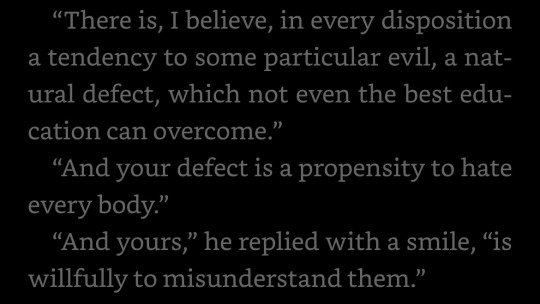
Again, Austen’s sleight of hand: when we first read this, it sounds more like Darcy is just a misanthrope who has a negative and pessimistic attitude towards people. That’s how Elizabeth hears it too.
But he tells us himself: that’s not what he means. Elizabeth (and the reader) is misunderstanding him. And he shows us, right away, by taking her jibe in good humour right then and there.
Multiple times, Elizabeth teases or attacks him, and he’s cheerful about it. He thinks it’s kind of funny. Bingley gets a shot or two in, and Darcy takes that on the chest too.
Austen manages to create this impression of him in the reader’s mind of a guy who is angry and prideful all the time, but when we review his actions, how often is this really true?
4) Darcy through the eyes of others
In many analyses, Elizabeth is blamed for being so easily taken in and so stubbornly mistaken in Darcy, but in all fairness, look at what she has to work with!
So much of what she learns about him is through other people, and so what she knows is filtered by their interests, skewed perspectives and compromised judgements. The fawning of Caroline Bingley and Mr Collins, the hatred of George Wickham, the deference of Mr Bingley, the lack of deference from Colonel Fitzwilliam, the way Charlotte views men, the way Jane always finds good things to say about anybody, her mother’s vulgar prejudice, all of it adds to a picture of absolute confusion. And the worst offender is Darcy himself, of course, because he stubbornly refuses to clarify anything about himself, partly because he can’t and partly because he just won’t.
Darcy’s stay in Hertfordshire culminates in this exchange, at the Netherfield Ball, between Darcy and Elizabeth:
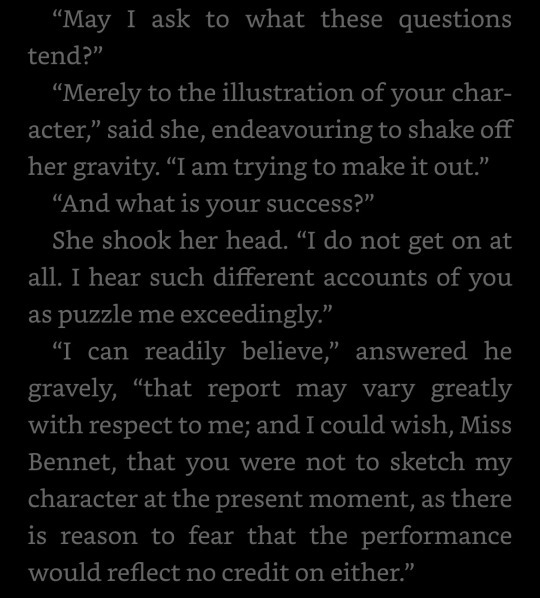
5) Mr Darcy in love
Darcy really is a hard nut to crack, and in large part it’s because he makes himself hard to crack. The baseline here is pretty bad but it gets so much worse the more he loves Elizabeth and the more he is determined to hide from her.
Before, he just doesn’t care what people think of him. But now, he does care and he desperately wants them not to know that he has, annoyingly and embarrassingly, fallen head over heels in love.
Austen strings us along in this confusion until the absolute shock that comes with his proposal. Even though we as readers always knew more than Elizabeth did, and even though both we the readers and Elizabeth had tonnes of evidence and clues about Darcy and his real character, this twist comes as a complete surprise.
And because we, the readers, and Elizabeth, the protagonist, are surprised, we don’t notice another important clue. Darcy is also shocked. Like, we’re all sitting in this scene, aghast, amazed, shocked. We all came to this point following a trail of wrong clues, misdirections, misunderstandings and mistaken assumptions.
But what does this tell us about Darcy? Other than what he finally reveals through his letter, we learn that the entire time he thought Elizabeth:
Knew what she was doing, flirting with and encouraging him
Understood his prevarication
Expected a proposal
The poor man doesn’t come out of this looking good, does he? It makes him look really arrogant, self-important and big-headed. And to an extent, well, it is.
But there’s also another, kinder, reading to all this: that he’s someone who overthinks things.
There’s the conversation in Netherfield with Bingley where he deprecates those who do things rapidly as if it were a virtue. We know from other parts of the novel that he’s a bookish (he prides himself in his library), intellectual (he admires those who read), “clever” (in the narrator’s own words) guy.
Used to responsibility, used to being relied on to guide and advise people, used to solving knotty problems, Darcy approached his problem (loving a girl who is in every way beneath him) in the same way. He deserves a large portion of the smackdown he receives—no argument from me here. It does him good, later, as we all know. But when we revisit the novel, these deeper dimensions of his character become more apparent whenever we come to this moment: that Darcy’s flaws are not just the obvious ones here (pride, arrogance, lack of manners) but also shades of other traits of his.
6) A mystery to the very end
At this point, Austen begins to clear the mist a little. Darcy gets such a blow with Elizabeth’s rejection that our heart does go out to him, and then the letter explains so much, you begin to feel like he’s been wronged with our harsh view of him. We’re brought into his home, and so, slowly, we are shown that, yes, he’s sort of quiet and taciturn, and maybe his people skills aren’t exactly up there, but he’s actually quite nice, at least willing to try to be outwardly more friendly, but in essence he’s a kind person and a responsible landowner. Elizabeth begins to see that he’s rather attractive.
The reader and Elizabeth begin to thaw towards him. And then Lydia runs away, All seems lost. Wickham has been such a wicked force in Darcy’s life, Elizabeth has already tried Darcy to the edge of what any reasonable man would put up with and Elizabeth’s family exposes herself in the worst possible way.
What I love is that Darcy’s true character is always, always most visible through his actions. This mirrors the whole point of the novel of course: that we should pay attention not to impressions, superficialities (words) but to what people really are, and what they actually do (actions). So, Darcy doesn’t say anything, in fact he swears everybody to silence. He just does. He saves Elizabeth’s family in the most warm-hearted, generous and forgiving way possible.
Anyway, I could write books on this subject just because of how much there is to say, and this is but the tip of the iceberg, but I’ll leave off here. I just wanted to explain why I love Mr Darcy, the character, and why you should too. Not as a literary romantic hero, not as a literary crush but as a really interesting, beautifully written, complex character in his own right.
112 notes
·
View notes
Text
The Hound of the Baskervilles: The Curse of the Baskervilles
CW for discussion of crimes against humanity.
Devonshire is a historical alternative name for the county of Devon, these days not seeing that much use. Devon and next-door Cornwall have a friendly rivalry going over various things, including the order in which you put cream and jam on a scone. Cornwall does jam first, Devon cream. Getting it the wrong round in the relevant county can attract disapproving looks.
Mainstream Christianity believes that the only sin that cannot be forgiven by God is "blaspheming against the Holy Spirit", which is a continuous and arrogant rejection of it. It is generally deemed impossible for a Christian to actually do because if you worried that you've done it, you're not rejecting the Holy Spirit.
The Great Rebellion is the then standard name for what is commonly called the English Civil War or less commonly, but more correctly the War of the Three Kingdoms - England, Scotland and Ireland all being their own kingdoms under a single monarch, Wales is a principality. Lasting from 1639 to 1653 and including a whole bunch of conflicts, including two English Civil Wars. Various videos explaining the whole rather complex affair with varying degrees of comedy can be found on YouTube, but the popular version is that a bunch of republicans (Roundheads) with short hair fought a bunch of monarchists with long hair (Cavaliers). To quote Arnold Rimmer, it ended "1-0 to the pudding-basins" and King Charles I ended up losing his head in public.
Edward Hyde, 1st Earl of Clarendon, a key member of the governments of Charles I and Charles II wrote some memoirs of the whole period. Initially written between 1646 and 1648 as a defence of the former, his fall from power and exile in 1667 (he was made to carry the can for the English defeat against the Netherlands in the Second Anglo-Dutch War despite having little involvement) resulted in a massive expansion and re-write of The History of the Rebellion, which generally runs to no less than six volumes. One can compare it to Winston Churchill's The Second World War it seems - interesting, but watch for bias.
A yeoman in this context was a commoner who owned the land that he farmed, as opposed to being merely a tenant. Indeed a third of all farmland remains run by tenanted farmers; including much of Dartmoor, which is owned by the Duchy of Cornwall, the land holdings of a (male only) heir to the throne.
A maiden is traditionally an unmarried girl or young woman, with a strong implication of virginity to boot.
Michaelmas is a Christian festival held on 29 September in honour Saint Michael and all the other angels. It was traditionally associated with the end of harvest and a bunch of other stuff, including the legal calendar. The Lord Mayor of London (not to be confused with the Mayor of London) is elected on this. Traditionally the meal eaten here included goose, but it has very much fallen out of fashion in modern Britain.
A carouse (also a verb) is basically a long drinking and dancing event; "Carouse" turns up as a skill in some RPG systems i.e. the ability to do this effectively without ending up on the floor next to your vomit.
"Terrible oaths" here mean foul language.
A league is three statute miles, so she's got to get nine miles or 14.9 kilometres. That's a rather long way to go, especially in the dark.
A flagon is a large vessel for containing drink, about 2 imperial pints or 1.1 litres in capacity. You can either use it for pouring (in which case it will have a spout) or drinking from directly.
Trenchers were flat wood or metal plates used for serving food. In medieval times, they would be made of stale bread. After the meal, these and the juices, leftovers etc. would be generally given to the poor. Eating the trencher yourself was considered rather vulgar.
"Wench" has had various meanings over the years. In Shakespeare's time, it was a neutral or even endearing term for a young woman. It then evolved into a female server, particularly at a tavern (with the associated sexy costume, although I am not sure when that became a thing) and from there to being a term for a prostitute, with "wenching" becoming a verb to mean using the services of them. With an associated meaning of a promiscuous woman. It is not clear whether the writer is using the term or Hugo is here. I can see the latter using it in a rather venomous way.
A kerchief is another name for a bandana.
The pistols of the period were single-shot weapons requiring reloading with powder, wadding and shot. Even with regular practice like in an army (where this was a major part of drill), you'd be looking at a 15 to 20 second reloading time. It was commonplace to carry two pistols (a brace) as a result, at which point the fight was either over, or it was time to get your sword out. Some went still further - Blackbeard, who was going progressively crazy with syphilis, is recorded as carrying six loaded pistols on him.
There were 16 fatal dog on human attacks in the UK from January to September 2023; a sharp rise blamed on the American XL Bully breed, which was promptly banned in England and Wales as a result.
Providence means God's intervention in the universe.
"Which would not forever punish the innocent beyond that third or fourth generation which is threatened in Holy Writ" is a reference to the Commandment about not creating graven images or idols, either the Second Commandment or part of the First depending on your denomination; Anglicans put it as the Second.
"The probable Liberal candidate for Mid-Devon" is going to form part of a post discussing late Victorian elections, because I could go on all days about those. Central Devon was a narrow Conservative hold in 2024, by the way.
Nouveaux riches is French for "new rich", commonly rendered as "new money". The "aristocracy" on both sides of the Atlantic (see The Gilded Age) looked down on the new millionaires who were being created by the Industrial Revolution, such as railway tycoon Cornelius Vanderbilt.
The discovery of diamonds at Kimberley in 1867, followed by gold at Witwatersrand in 1886, led to a vast boom that turned what would become South Africa from an agricultural economy to a wealthy industrial one... most of that wealth ending in the hands of white people, of course. Indeed, it led to the actual creation of South Africa in the first place.
Inquests are held in England and Wales after any death that is violent, unnatural, a possible suicide or in custody. These were at the time conducted with a jury, but this has become much rarer since 1927, when a coroner can do it on their own in many cases. In the case of a murder, an inquest will be opened and adjourned to allow the police to investigate. This process can take quite a while; after the Manchester Arena bombing of 2017, a full public inquiry into the event was held and following the end of that in 2003, the same judge then conducted an inquest into the death of the bomber himself, as was legally required. No public hearings were held in this case to avoid attention and save public money. The conclusion was officially logged as "suicide while undertaking a terror attack that murdered 22 innocent victims and injured many others", Sir John Saunders clearly that merely putting "suicide" was insufficient.
The Gypsy and Traveller community have long been associated with horses, with the Appleby Horse Fair being held every June in Cumbria. The RSPCA have a large presence at the event to deal with any animal welfare issues, issuing warnings and will take animals away or prosecute people if required. The 2024 event saw two horses worked to death, the official website posting the RSPCA's request for information on those responsible.
I've discussed Bushmen/San in one of my posts on The Sign of Four.
"Hottentot" is a now-offensive term for the Khoekhoe nomadic pastoralists of Southern Africa, often grouped with the San. Its use in the 1964 Mary Poppins film has seen that movie reclassified in the UK from a U (universal) to a PG.
They are split into the Northern Khoekhoe or Nama, located in Namibia and Botswana, and the Southern Khoekhoe or Cape Khoe found in the SW coastal regions of South Africa. At the time this book was set, these were, respectively:
German South West Africa
Bechaunaland Protectorate (de facto independent until 1891 when the British took active control)
The Cape Colony
Two years after publication, separate Nama and Herero rebellions in the former against colonial rule (the German aim being ethnic cleansing) were brutally defeated, with the peoples either shot dead, driven into the desert or placed into concentration camps. They were subjected to medical experiments, skulls being taken to Germany for use as demonstration of "racial inferiority". The similarities between this genocide and the Holocaust are clear, although the precise connections are debated by historians.
It is estimated that up to 80% of the indigenous population died as a result.
Germany has in the last decade offically recognised this as a genocide, agreed to pay €1.1 billion to the affected communities and has returned the human remains held in German universities or teaching hospitals.
On a final note, Mortimer failing to mention the footprints around the body might be considered perjury.
16 notes
·
View notes
Text

Excerpt from this story from KLAS (Nevada):
A rare toad caught in the middle of a plan to develop geothermal energy in Nevada’s Churchill County could get a protected home from the federal government.
The U.S. Fish and Wildlife Service (USFWS) on Friday published a proposal to set aside 930 acres — about 1.5 square miles — for the endangered Dixie Valley toad.
“We’re pleased that the Fish and Wildlife Service is proposing concrete action to protect the Dixie Valley toad,” said Patrick Donnelly, Great Basin director at the Center for Biological Diversity.
“This precious little amphibian is an integral part of a wetland ecosystem that sustains migratory birds, pronghorn and golden eagles. Protecting its habitat safeguards the abundance of life at Dixie Meadows.”
Donnelly’s group has publicized the Dixie Valley toad’s plight, and emergency protection under the Endangered Species Act was established in 2022. Permanent protection came later in the same year.
USFWS identified the geothermal plan as “the primary threat to the Dixie Valley toad” in its proposal to set aside the land.
15 notes
·
View notes
Text


On 15th June 1996 Sir Fitzroy MacLean, the Scottish soldier, diplomat, politician and author, died.
Fitzroy Maclean was a British diplomat who was one of the first Westerners to explore Soviet Russia. He was a founder member of the SAS, and later liaised on behalf of the allies with the Partisans in Yugoslavia.
Before World War II Fitzroy Maclean served as a diplomat at the British embassy in Moscow, from where he made several notable journeys to Siberia, the Caucasus and Soviet Central Asia.
During the war he served in the SAS and was also involved with the Free French forces in Iran. In 1943 he was dropped by parachute into German-occupied Yugoslavia as Winston Churchill's personal envoy and Commander of the British Military Mission to Tito and the partisans. He recorded some of these experiences in 'Eastern Approaches', a classic memoir, which has sold more than a million copies.
McLean wrote many other best-selling books and in addition to serving as Under Secretary for War in the post-war Churchill and Eden governments. Diplomat, soldier, statesman, traveller, writer - a true modern hero - Sir Fitzroy was often put forward as the model for his friend Ian Fleming's 'James Bond', a distinction he neither accepted nor denied.
Fitzroy Maclean died while he was visiting friends in the English village of Hertford having just completed a swim at the age of 85!!!, he was stricken by a heart attack and died instantly, I think he would rather have gone that way rather than faded away. . He was returned to the location of the family home in the village of Strachur, Argyll County and was interred in the cemetery of historic Parish Church.
There’s a great article about the man here https://warisboring.com/fitzroy-maclean-fought-the-nazis-blew-up-forts-and-met-a-king/
14 notes
·
View notes
Text

Sand Mountain, near Fallon, 2020.
31 notes
·
View notes
Photo










Clouds (No. 913)
Peddler Hill Scenic Viewpoint, CA (two pics)
Sand Mountain Recreation Area, NV (eight pics)
#Peddler Hill Scenic Viewpoint#Sierra Nevada#El Dorado National Forest#USA#Sand Mountain Recreation Area#Nevada#desert#California#landscape#blue sky#countryside#original photography#summer 2022#tourist attraction#Churchill County#tree#flora#nature#woods#bush#grass#Western USA#clouds#light and shadow
12 notes
·
View notes
Photo

Report generated at 2024-11-20 15:09:32.942752-08:00 using satellite imagery and alert data provided by the National Weather Service.
Wind Advisory
Northeast Foothills/Sacramento Valley
Northern Lake County
Sonoma Coastal Range
Central Sacramento Valley
North Bay Interior Valleys
North Bay Interior Mountains
Mineral and Southern Lyon Counties
Mendocino Coast
Greater Reno-Carson City-Minden Area
Marin Coastal Range
Foothills of the Northern Blue Mountains of Oregon
Northern Sacramento Valley
Southern Lake County
Coastal North Bay Including Point Reyes National Seashore
San Francisco Bay Shoreline
Mono
San Francisco Peninsula Coast
San Francisco
Flood Watch
WA: Mason
Northern Lake County
Northwestern Mendocino Interior
Central Sacramento Valley
North Bay Interior Valleys
Del Norte Interior
Mountains Southwestern Shasta County to Western Colusa County
Shasta Lake Area / Northern Shasta County
Southern Trinity
Coastal Del Norte
Northeast Foothills/Sacramento Valley
Southwestern Mendocino Interior
Northern Humboldt Interior
North Bay Interior Mountains
Southwestern Humboldt
Sonoma Coastal Range
Southeastern Mendocino Interior
South Central Oregon Coast
Southern Lake County
Coastal North Bay Including Point Reyes National Seashore
Northern Humboldt Coast
Southern Humboldt Interior
Northeastern Mendocino Interior
Mendocino Coast
Marin Coastal Range
Northern Sacramento Valley
Winter Storm Warning
Sun Valley Region
Burney Basin / Eastern Shasta County
Western Siskiyou County
Western Plumas County/Lassen Park
North Central and Southeast Siskiyou County
West Slope Northern Sierra Nevada
Mountains Southwestern Shasta County to Western Colusa County
Sawtooth/Stanley Basin
South Central Siskiyou County
Shasta Lake Area / Northern Shasta County
Big Lost Highlands/Copper Basin
Okanogan Highlands
Northern Trinity
Northern and Eastern Klamath County and Western Lake County
Central Siskiyou County
South Central Oregon Cascades
Siskiyou Mountains and Southern Oregon Cascades
Winter Weather Advisory
North Oregon Cascades
Northern and Eastern Klamath County and Western Lake County
Central Panhandle Mountains
Northern Panhandle
Cascades of Lane County
Klamath Basin
East Slopes of the Oregon Cascades
West Central Mountains
Boise Mountains
Cascades of Marion and Linn Counties
West Slopes North Cascades and Passes
Northeast Mountains
Modoc County
Lassen-Eastern Plumas-Eastern Sierra Counties
High Wind Watch
Coastal Del Norte
Southern Humboldt Interior
Northern Humboldt Interior
Del Norte Interior
South Central Oregon Coast
Curry County Coast
Northern Humboldt Coast
Southwestern Humboldt
Flood Advisory
CA: Sierra, Lassen, Sonoma, Napa, Plumas
High Wind Warning
Central and Eastern Lake County
Northeast Siskiyou and Northwest Modoc Counties
Klamath Basin
Northern and Eastern Klamath County and Western Lake County
Central Siskiyou County
Modoc County
High Surf Advisory
Tillamook County Coast
San Luis Obispo County Beaches
Central Coast of Oregon
South Washington Coast
Santa Barbara County Central Coast Beaches
Central Coast
Clatsop County Coast
Coastal North Bay Including Point Reyes National Seashore
San Francisco Peninsula Coast
North Coast
San Francisco
Southern Monterey Bay and Big Sur Coast
Beach Hazards Statement
Northern Monterey Bay
Flood Warning
CA: Siskiyou
OR: Curry, Coos, Josephine, Jackson
Coastal Flood Advisory
Western Whatcom County
San Juan County
Lake Wind Advisory
Greater Lake Tahoe Area
Red Flag Warning
Lahontan Basin - Churchill and Eastern Mineral Counties
Southern Mono County
Southern Sierra Front - Alpine/Northern Mono/Southern Lyon/Western Mineral Counties
West Humboldt Basin - Pershing County
Northern Sierra Front - Carson City/Douglas/Storey/Southern Washoe/Eastern Lyon/Far Southern Lassen Counties
High Surf Warning
South Central Oregon Coast
Curry County Coast
Avalanche Warning
South Central Siskiyou County
5 notes
·
View notes
Text
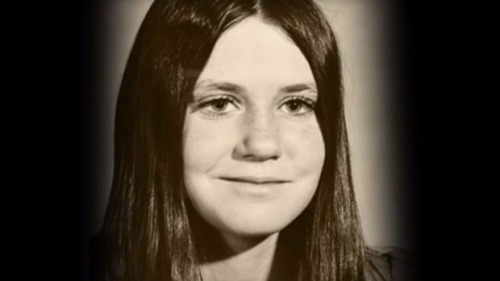
The death of 14-year-old Karen Caughlin has been at the centre of a 44-year-old cold case in Sarnia, Ontario, Canada.
Karen was last seen alive at approximately midnight on the 16th of March, 1974. She had spent the evening roller skating with her friends at Rose Gardens in Point Edward. In the mid-morning hours of that morning, a farmer discovered the lifeless body of Karen near the side of Plowing Match Road between Churchill Line and Lasalle Line in Lambton County. Her body was riddled with bruises and contusions.
It was initially believed that Karen had been brutally beaten to death. However, it was later released that her injuries were consistent with being hit by a vehicle. It had been particularly foggy in the early morning hours and its presumed that somebody had accidentally ran into Karen as she walked home. What was clear, however, was that whoever knocked Karen down, decided that instead of seeking medical help, they decided to transport her body 23 kilometres into the ditch where she was left to die from her injuries.
47 notes
·
View notes
Text
Bloodline: Part One
Pairing: Spencer Reid x Female!Reader
Word Count: ~1.9k
Summary: Never have you heard of a family killing together, and never have you heard of generation of families killing together. Yet here you are.
Warnings: canon violence, canon language, canon talk of death, methods of kill
Author’s Note: I do not own anything from Criminal Minds. All credit goes to their respective owners. If there are any warnings that exceed the normal death/kills from the show, I will list them. If you’ve seen the show, then it’s the same level of angst unless otherwise stated
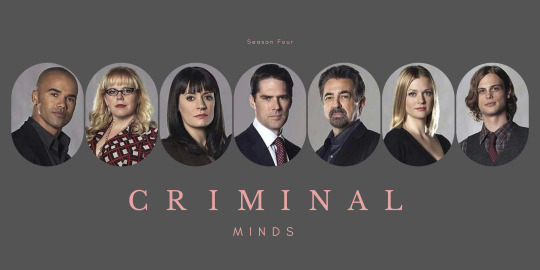
x
There is no doubt that it is around the family and the home that all the greatest virtues, the most dominating virtues of human society, are created, strengthened and maintained." - Winston Churchill
The last case was a rush because they called you in after three women were dead, but this time is different. Alabama PD discovered a family killed inside their home and immediately called your team in due to the brutality of the murders. You didn't even have time to talk in the briefing room since this is a top-priority case.
After everyone gets settled on the plane, the meeting starts. JJ is still on maternity leave, but Jordan doesn't want to do this job anymore. Not after the case with Norman, the guy who was killing people with his sawed-off shotgun after they cut him off while driving. She got a look into how brutal the job can be and decided it isn't for her.
However, JJ has one more week until she's back so this will be Jordan's last case.
A family was found murdered inside their home at one in the morning, and their ten-year-old daughter is missing. Cases involving children are always the hardest because most children don't survive within the first twenty-four hours of being kidnapped. Cate is ten years old, but that doesn't mean she's safe from being murdered like the rest of her family.
You have about half a day to find her alive.
"We got the links of the crime scene photos." Jordan pulls up the photos of the family who was killed. "This is Geoff and Nancy Hale with both their throats cut."
"Is there any evidence of abuse?"
"No."
"Slitting someone's throat is quick and efficient."
"That's because the real target was down the hall," Emily says.
"She has a name," Jordan snaps. "She's not 'the target'. Her name is Cate and she's ten years old."
Tension is thick, but Rossi keeps the conversation moving along as if this didn't happen.
"Is an amber alert in effect?"
"Since seven this morning."
"With the unsub's head start he could be anywhere within a four-hundred-mile radius. Make sure that they're casting a wide enough net. Who discovered the bodies?"
"Jim Scheuren, Cate's biological father. He was supposed to take her for the weekend. The police don't consider him a suspect."
"We'll want to talk to him anyway. We're also going to need a list of registered sex offenders in a twenty-mile radius."
"What's the makeup of the Hales' neighborhood?" Spencer asks.
"Mostly white and middle class."
"We'll need aerial views of the neighborhood. If Madison County doesn't have them, talk to Garcia. Dave, you, Y/N, and Morgan go to the crime scene. The rest of us will get up to speed at the precinct."
Once landed, everyone broke into their own little groups with you heading out with Derek and Rossi. The Hales' neighborhood is a series of rural roads and one-block streets. It's about three miles to the nearest main street, so he didn't happen upon Cate by accident. Her father, Jim, might not have been the one to do this, but he might know who did.
In the meantime, you arrive at Cate's house which is covered with police personnel and yellow caution tape. You don't have to get out of the car to feel the tragedy that happened here. Since this happened just last night, there are different colored energies pouring out of the place.
The detective on the case sees you arrive and walks over to greet you.
"Bo Whitaker," he shakes hands with Rossi.
"David Rossi. This is Derek Morgan and Y/N."
"Pleased to meet you. The point of entry is around the back. The neighbors didn't see or hear anything, and the dogs lost the scent almost immediately."
"It's not hard to target a family out here."
"Yeah, even in broad daylight. If you walk five feet off the track, you could get lost for days. He had plenty of time and privacy to watch what he was really after."
There is a tire swing in the front yard, and Cate's energy is swirling around it since she really loved that swing. The energy is strong enough for it to take her form, and you're the only one who can see her. She has a smile on her face as if nothing bad could ever happen to her.
You look away in sadness and hope that she is alright.
"I prefer cities. You can see them coming," Rossi comments.
Bo takes you to the window the killer came in through, and there is not only one energy stemming from it, there are three. You head inside the house and see the pane of the door knocked in when they tried to kick the door in. That's when they used the window to get in. There are three energies inside the house: red, blue, and yellow. That can only mean one thing--the murderers are a whole family.
"Do you think the girl's dead?" Bo asks.
"It depends on what he took her for."
"I don't think we're looking for one unsub," you say. "We're looking for a family. There are three different energies inside the house, not including the family who lived here. There are three different energies stemming from that broken window. One red, one blue, and one yellow. One male, one female, and one child."
"How do you know this?" Bo asks.
"I'm a psychic. I see the energies of the killers."
You leave their side without hearing Bo's response, but you do hear Derek back you up. You're the real deal, and they trust you wholeheartedly. You walk into the master bedroom where the parents were found, and there is blood all over the walls, bed, and even the ceiling. There are two people in the bed with their throats cut, but you know they're not real. Derek heads over to Cate's room to examine it, eventually joining you and Rossi in the master bedroom.
"Find anything in Cate's room?" Rossi asks Derek.
"That's what's weird. There's no sign of struggle. It didn't even look like she tried to get out of bed in a hurry."
"Her parents' throats were cut. If there was the element of surprise, they might not have had time to scream," you say.
"Both of them?"
Since you can see the parents and their wounds, you can determine what might have happened last night.
"So both parents don't have any ligature marks, and neither of them are tied down. There are no defensive wounds either. Geoff's cause of death was a single deep, smooth cut that severed the carotid artery. Nancy's cause of death was caused by a series of jagged, shallow wounds that punctured the carotid artery."
"There's more than one unsub, like you said," Derek says.
"Are you guys sure?" Bo asks.
"It makes sense. If there was only one unsub, then he would have had to restrain Nancy while he killed Geoff. Since there are no ligature marks on either of them, then that means he didn't restrain them. If he killed Geoff without restraining her, and she woke up, then she would have screamed. It would have alerted the entire family. We're looking at multiple unsubs."
"So, things are worse than we thought."
"Yes and no. Cate's chances of survival just got better. Two or more unsubs change the dynamics."
"What do you mean, dynamics?"
"They spend more time with her," Rossi sighs.
Derek calls Hotch to let him know while you go into the bathroom to see what kind of motive there might have been for taking Cate. You look inside the medicine cabinet and see something that makes Cate's chances of survival go right down to almost zero.
"I found something here." You walk out of the bathroom holding a pill bottle. "Cate has seizures, and if the unsubs find out about this, they might kill her."
With this new information, you head back to the police station to discuss what this might mean. Hotch pulls you off to the side, and you hand him the pill bottle you took from the scene.
"Give me your honest opinion on what your theory is."
"Based on the energies I saw at the house, I believe a family of three killed Cate's family. A mom, a dad, and a young son. They're killing everyone but a young daughter to maybe complete their family. Maybe they can't have more kids and want to be a family of four, or maybe their real daughter died and they're trying to replace her. It's the only theory I have right now."
"It's a theory nonetheless."
"If my theory is correct, and they find out Cate has seizures, then she isn't perfect. She could be dumped somewhere or killed. Either way, I have a feeling we'll know tomorrow."
And tomorrow you found out. Cate was dumped on the side of the road with her feet and hands bound, but she is very much alive. She was taken to the hospital immediately just as they contacted her father. Since she got medical care so soon, she's going to be fine. She is the best person to talk to about this kind of stuff, and since you can use her trauma to paint a picture, then you're going to talk to her.
"Her father's with her," the nurse says when your team arrives. "She's been in and out of consciousness but her vitals are stable."
"Any sign of sexual assault?" you ask.
"We haven't tested yet. We want to give her time to process."
"May we speak with her?"
"Sure. You should know, seizures often come with retrograde amnesia. She might have holes in her memory."
"Y/N, you should do this alone," Hotch says.
You knock on Cate's door before entering. Poor thing looks so scared, but you're going to do everything you can to make her feel comfortable and safe.
"Hello, Mr. Scheuren. I'm Agent Y/N from the FBI. I would like permission to speak with your daughter."
"Okay."
He doesn't move from her side, and you clasp your hands in front of you.
"I'd like to do this alone, if possible."
"Why?"
"I need to ask her certain questions, and sometimes it's easier for a girl to answer those questions when there are no men present."
"I'm her father," he gets upset.
"Daddy, please?"
"Alright, baby," he sighs. "I'll be right outside."
"Thank you." As soon as he leaves, you take a seat next to Cate and give her a kind smile. "My name is Y/N. I'm so sorry about your mom and your stepdad. I'd like to ask you some questions so we can find out who did this. Is that okay?"
"Yeah."
"Do you mind if I hold your hand?"
"No."
You hold her hand and place your other one over hers.
"I'm going to ask you some questions, and it's going to be about the things you sensed--things you saw, felt, etc."
"I'm scared."
"I know you are. It's okay to be scared. I'm right here with you. Just close your eyes, okay? What's the first thing you remember?"
She closes her eyes and you use her words to help paint a picture of what happened to her or where she might have been.
"It's cold, like outside cold."
"Okay, who's there?"
"A man. He told me to keep quiet."
"What is he doing?"
"He's holding my hand. It hurts. He's waiting for something."
"What does he look like?"
There is a much older white man with her with blood on his face. This happened after he got done killing Cate's parents. He's mean, balding at the top, and has a hint of a mustache that looks freshly shaved. It's a vague description, but it's the only thing you see right now.
"I don't want to be here," Cate whimpers.
"He can't hurt you, Cate, I promise. I'm right here."
"He's tall with dark hair. He's old."
"Old like me?"
"Old like my dad."
"Is anyone else there?"
"Someone's coming! Y/N! Y/N, help me!!"
The old man grabs Cate and slings her over his shoulder. She tries to fight him, but her hands are tied together. A car approaches and pops the trunk from the inside, and the unsub shoves Cate into the trunk.
"Cate, you're right here with me. I promise he can't hurt you. It's okay."
"He put me in the trunk of the car."
"How long were you in there?"
"Not long. Maybe ten minutes."
"Was the ride bumpy or smooth?"
"It was smooth." That tells you the roads they took are main roads instead of back ones. If they took the main road, then someone might have seen the car. "I wanted to scream, but no sound would come out."
"You're doing really good, Cate. Once the car stopped and they opened the trunk, what did you hear?"
"Wind through the trees."
The man takes Cate out of the trunk and drags her into some kind of trailer house before stuffing her inside a small space like a closet.
"What do you smell?"
"Cooking. I'm inside now. They've taken my shoes off."
"It's so you don't run. I want you to look down at your feet and tell me what you're standing on."
"Carpet. I'm in a little room with clothes and tinfoil all around me."
"What else?"
"I hear bells."
"What kind of bells?"
"Small ones like a fairy. Every time they ring, the man says something to the boy."
She must mean the young son whose energy you saw inside the house.
"How old is he?"
"Nine or ten, I'd say. His parents want me to play with him. They're calling him puyule, whatever that means."
The closet door opens and the young boy tries to take Cate out of the closet. His parents encourage her to come out to spend time with her, but she doesn't want to go.
"Y/N, I don't want to go. No! Don't make me go! Y/N!"
"Cate, it's okay. You're right here next to me. Open your eyes." She does, and you pat the back of her hand with a smile. "See? We're in the hospital. He can't hurt you anymore. You did so well. I'm going to send your dad back in here, okay? You just rest now."
"Okay," she sniffles.

x
Follow my library blog @aqueenslibrary where I reblog all my stories, so you can put notifications on there without the extra stuff :)
#spencer reid#spencer reid x reader#spencer reid fanfic#spencer reid fanfiction#spencer reid fan fic#spencer reid fan fiction#spencer reid fic#spencer reid fluff#spencer reid angst#criminal minds#criminal minds fanfic#criminal minds fic#criminal minds fan fiction#criminal minds fan fic#criminal minds fanfiction#criminal minds fluff#criminal minds angst#criminal minds series rewrite#series rewrite#cm season 4
40 notes
·
View notes
